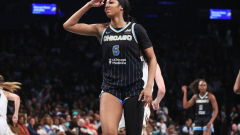
INDIANAPOLIS — When Sam Smith died in his modest home on the east side of Indianapolis, he died a man who not long before had swallowed his pride and made a phone call to ask for gas money. He died a man who had to make a call to ask for help with funeral expenses for his daughter.
He died a man who was an American Basketball Association player, a pioneer who blazed the trail for what the NBA is today.
But basketball ended for Smith. After winning an ABA championship with the Utah Stars, he got a job as a security supervisor at the Ford assembly plant in Indianapolis. Years passed. Times got harder. More years passed.
As Smith’s 50th reunion for his Kentucky Wesleyan NCAA Division II championship approached five years ago, he called the Dropping Dimes Foundation, which helps struggling ABA players and their families.
Smith didn’t have the money to get to his reunion, he told Dropping Dimes CEO and founder Scott Tarter. He needed a loan, and insisted it be a loan, for $250. Dropping Dimes gave him the money and told him it was a gift, not a loan.
Smith waited, hoping he wouldn’t have to make another call to Dropping Dimes. Hoping for the $2,000 a month pension he said he was owed by the NBA for his five years playing in the ABA, which merged with the NBA in 1976.
Two years later, Smith had to make another call. His daughter had died a single mother, leaving her 5-year-old son with autism for Smith and his wife, Helen, to raise.
STAY UP-TO-DATE: Subscribe to our Sports newsletter now!
“He called me up in tears,” said Tarter. Smith didn’t have the money to pay for his daughter’s funeral.
Dropping Dimes helped and Smith waited some more, hoping. The pension from the NBA never came.
Weeks before Smith died at the age of 79 on May 18, lying in a hospital bed next to an ABA basketball, a chilling photo was taken. It was a photo Smith wanted people to see.
“He grabbed my arm and pulled me closer to him,” said Tarter, who took the photo. “And he said, ‘I would do anything to get the NBA to help these guys.”
Maybe the photo would help them. Smith knew it was too late for him.
More: NBA says it’s in discussions to help former ABA players: ‘They’ve been waiting a long time’
More: Former ABA players struggling and running out of time: ‘The NBA’s waiting for us to die off’
‘It would have been life changing’
These former ABA players are in their late 60s, 70s and 80s. Some are homeless, living under bridges. Some die alone with no money for a gravestone. Others can’t even afford dentures or a new suit to go to church.
Smith considered himself lucky compared to his former teammates. At least he had the health insurance from Ford. But $2,000 a month would have been a windfall for the family, said Smith’s wife, Helen.
“It would have been life-changing,” she said. “Because we were living. We were getting everything paid, but we couldn’t do a lot more.”
When the ABA disbanded in 1976, merging with the NBA, four of its 11 teams were absorbed by the NBA — the Pacers, Nuggets, New York Nets and San Antonio Spurs. The players who didn’t find a long-term spot in the NBA were left with no pension, salaries shut off and health insurance gone.
NBA players have had a pension plan since 1965. Any player with at least three years of service in the league is eligible for a monthly payment and access to other benefits, such as life-long healthcare coverage, a college-tuition reimbursement program and more.
Many of the ABA players never got to the NBA after the merger. Some did, but played only a year or two. Without those three years of service, it doesn’t matter how much they contributed to the ABA, they are left without that payout.
Smith is one of those who gave his all for a league and ended up with nothing.
“I am so mad at the NBA,” said Tarter. “Here is a guy who should have been enjoying a pension and instead … another one is gone.”
In February 2021, after the IndyStar published a story revealing a majority of the ABA players who are struggling are Black, the NBA responded.
“We are in discussions with the Dropping Dimes Foundation on this issue,” NBA spokesman Tim Frank said at the time. Frank confirmed Wednesday that those discussions continue.
The amount of money it would take for the NBA to fund what Dropping Dimes is asking for in ABA pensions, $400 a month for each season of play, is at most $35 million, Tarter said. That amounts to one third of what the NBA donates to charity each year from the player fines the league takes in, he said.
There are 138 ABA players still alive who Dropping Dimes says should be getting pensions.
Michael Husain, a producer and director with Good Vibes Media, is working on a documentary “The Waiting Game,” chronicling the struggles of former ABA players and their fight for pensions.
Many players have told him, Husain said, “I don’t want to believe it, but in some ways, it feels like they are just waiting for us to pass.”
‘It was hard for him to ask for help’
Life was going to be amazing for Smith, a 6-7 forward born in Hazard, Kentucky. He played football and basketball for Hazard High and was a Kentucky State basketball All-Star in 1962.
He became the first Black player to start for the University of Louisville and after transf





